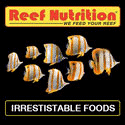
Smaller fish, such as Blue-Green Chromis (Chromis viridis), are most likely to be affected by chronic elevated dissolved gas levels in your aquarium
If you’re like most marine aquarium hobbyists, you probably don’t give a great deal of thought to the levels of dissolved gases in your system beyond making sure you’re providing good aeration and circulation. But under certain circumstances, these levels can get out of whack to the detriment of marine livestock.
Jay Hemdal, Curator of Fishes and Invertebrates for the Toledo Zoo, explains how in the following excerpt from his book The Salt Smart Guide to Preventing, Diagnosing, and Treating Diseases of Marine Fishes.
Dissolved gases: All aquarists are aware that their aquariums require a minimum concentration of dissolved oxygen in the water for their fish to survive. Many aquarists are also aware that if gases are dissolved in too great an amount, supersaturation can occur, causing serious health problems in their animals. Due to a lack of appropriate test equipment, most home aquarists can do little about measuring for potential problems with dissolved gas levels.
There are four basic concerns regarding the level of dissolved gases in aquarium water: acute supersaturation, chronic supersaturation, low dissolved oxygen tension, and high carbon dioxide tension. MORE










0 Comments